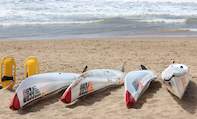What You’ll Need
Surf skis are sit-on craft featuring a deep seat well, and you are positioned with your legs extended straight in front of you. The narrow beam, combined with a considerable length of around 6m, makes balance a rather capricious business.

You steer your surf ski with foot pedals, and the craft must thus be manufactured according to your exact body geometry, with the fit of your legs crucial to stroke, steering and rhythm.
Save money by opting for a used boat in good condition if you can, as this will leave you with some cash to spare for additional equipment. If you have any money left after splashing out on your ski, add these priority items to your shopping list: a paddle, a personal flotation device (or PFD) and a paddling jacket or wetsuit.
Without a paddle (generally a fibreglass-, resin- or carbon fibre composite) you will be in proverbial deep water. Opt for a lightweight, rigid ‘blade’ suited to your ski and approximately 1.25 times your height. Secure your paddle with a leash to make sure you don’t lose it in case you capsize, and always wear a good PFD (personal flotation device) to ensure your safety.
Steep Learning Curve

The learning curve is steep and ongoing, and the ocean skills required need to be honed during years of on-the-water practice. Start off by working on your balance, sitting with your legs dangling on either side of the ski to improve stability. Short strokes and a straight back are key until you master the art of balance; then you can bring your feet onto the ski.
Stability will improve as you increase your speed, and you will now be able to perform longer strokes. Reach the paddle further forward with your arm straight and locked at the elbow, and rotate your torso so that the load of the stroke is carried by your back and abdomen rather than your arms. Keep your upper body stable and concentrate on rhythmic and even strokes in sync with your breathing.
Two easy ways of becoming a more proficient paddler is to either join an experienced athlete for a few open water sessions, or to attend a surf ski clinic. Regular races are presented around the country, and competing in these will afford you the opportunity to interact with experienced paddlers and learn from them.